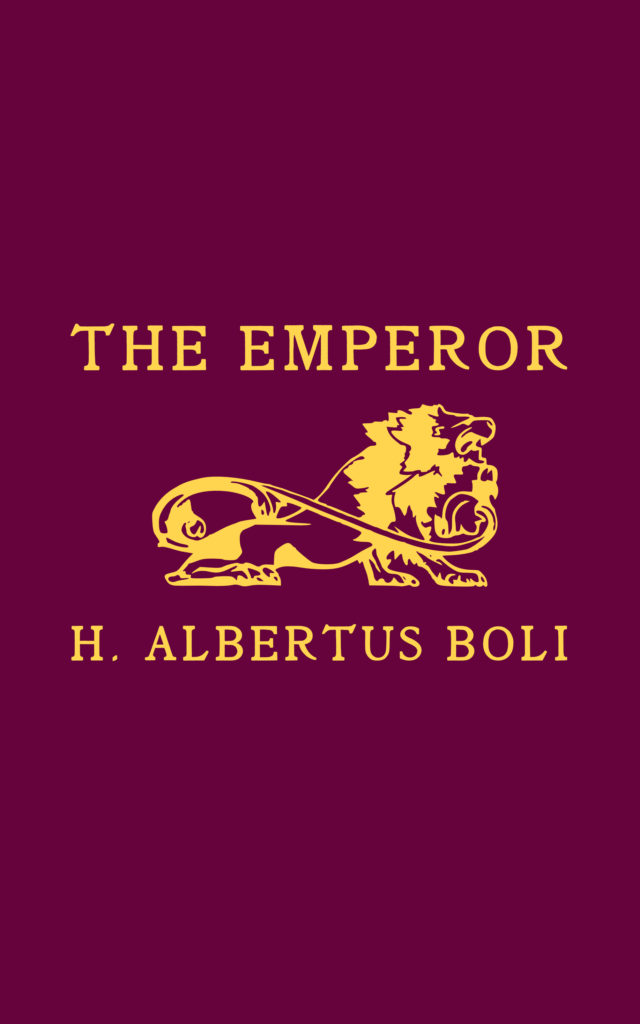The first chapter of a new novel now in print from Dr. Boli’s Celebrated Publishing Empire.
Important visitors—and it is a principle of the Sultan’s hospitality that every visitor is important—are invariably asked whether they would like to see this collection; and since they have been warned beforehand that an affirmative answer would be wise (for the Sultan’s ministers like it best when the Sultan is happy with his guests and there is no mess to clean up afterwards), they invariably accept his invitation.
So it happened when the Maharajah of Istanistan and his retinue paid a visit to the Sultan some time ago: the party adjourned from the immense dining hall after a particularly lavish feast and made its way through passages that were half corridor and half garden toward the collection rooms, as dozens of other parties of guests had done on dozens of other occasions. On this occasion, however, the Sultan’s ministers observed a few signs of uncertainty in their master. The signs were invisible to all but those who had known the Sultan for most of his life, but they were there: a smile (or at least a width of mustache) just a little too broad, a voice just half a step too high, a slight syncopation in his normally regular rolling gait. And the ministers knew the reason for these signs: the Maharajah was also a collector, and his collection was said to rival the Sultan’s. Since the Maharajah was an equal and a carefully cultivated ally, there could be no question of adding his head to the Sultan’s collection. But someone would suffer if the Maharajah proved insufficiently impressed. The Sultan’s ministers were worried.
Their worries did not diminish as the Maharajah was introduced to some of the glories of the collection. The Maharajah was scrupulously polite: he greeted every object with a bland smile and a few appropriate words of appreciation, always adding the disturbing information that he possessed something very similar.
“The head of Prometheus by Archippus,” the Sultan announced, looking up at his guest to judge his reaction. The Sultan was a naturally small man, though the constant attention of the best cooks in his domain had rounded him into a sphere. “It is all that remains of his colossal Prometheus Bound, mentioned with such admiration by Pliny.”
“Yes, very fine indeed,” the Maharajah replied after a cursory examination of the huge head, which was a good bit taller than he was—and the Maharajah was a tall man, whose natural taste for asceticism had given him the appearance of one of those spindly pillars that formed thick forests in many parts of the Sultan’s palace. He looked down at the Sultan, but he might have seemed to be looking not so much at his host as at his own reflection in the Sultan’s perfectly oiled helmet of black hair. “I have his Ariadne. A remarkable composition—perfectly intact, of course.”
There was a slight twitch in the Sultan’s upper lip: it might have passed entirely unnoticed had not his immense and luxuriant black mustache amplified the movement, so that by the time it reached the ends the mustache seemed to be trying to fly away like a raven. Nevertheless, the Sultan proceeded with what was probably a smile to the next item, a water organ that played, by an ingenious arrangement of cams on a wheel, a simple but very loud melody without the intervention of a human musician. The Sultan’s ministers discreetly stopped their ears, and the Maharajah’s party listened with petrified smiles; but the Maharajah himself maintained his cheerful blandness throughout the brief performance.
When the tootling ended and the mechanism hissed and clattered to a stop, the Maharajah rendered his appreciation: “Very elegantly constructed. Mine plays “The Lament of the Amazons.’ ”
In their minds some of the Sultan’s lesser ministers began to consider how they might formulate their wills.
So it was with most of the exhibits. The Maharajah pronounced the brazen oak with singing silver birds quite lovely: his own had birds made of gold, but the same mechanical principles were employed. The crystal tank with live sea-elephant was quite fascinating in its way: the Maharajah could offer some helpful advice on feeding the creature, based on his own success in keeping a breeding colony of the things.
With each successive exhibit the Sultan seemed less confident to his experienced ministers, who in turn were losing confidence in the attachment of their own heads to their bodies.
But the Sultan had not finished yet. “My dear Maharajah,” he said at last, “surely your collection must be one of the wonders of the world, and in almost every way the equal of my own. There remains, however, one thing in my collection that is unique, a precious treasure so rare and exquisite that I must keep it separately. Would you like to have a glimpse of it?”
“My dear Sultan,” the Maharajah replied, “nothing would please me more.”
